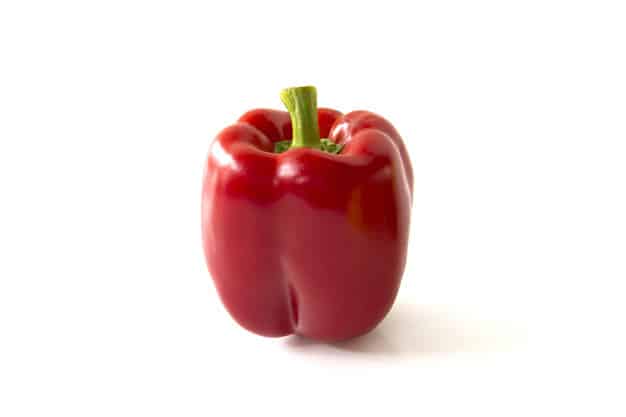Can rats eat bell peppers? That’s an excellent question. If you’re the owner of a pet rat it can be tempting to feed them whatever you want. After all, they’re omnivorous creatures that eat pretty much anything they come across in the wild. However, not all foods are healthy food rats to consume. As a rat owner, it’s essential that you do your research before introducing new foods into their diet.
Good news though. Rats can eat bell peppers without any issues and they can be a good addition to their diet. They’re rich in vitamins C, A, and potassium while being low in calories and fat. This makes them an excellent treat for your rat. They can eat green, yellow, and red bell peppers both raw and cooked. Also, you do not have to worry about the seeds because they’re not harmful to rats.
In the remainder of this post, I’m going to go over everything you need to know before you feed bell peppers to your pet rat. I will discuss whether or not this fruit (yes, it’s a fruit) is healthy for rats, the nutritional content of this plant, and much more. The main goal is to help you make an informed decision on whether or not to include bell peppers in your rat’s diet.

What’s in a Bell Pepper?

Many people wrongly assume that bell peppers are a vegetable. In reality, the Capsicum is a fruit native to South and Central America! Now, let’s take a look at what this fruit is made up of so we can make an informed decision about whether or not we should feed it to our rats.
Sweet peppers are very low in calories. 100 grams of this fruit only contains 31 calories. The reason why they’re so low in calories is that they’re almost entirely made up of water. A stunning 92% of this plant is made up of water which of course does not contain any calories. In addition, the plant is very low in fat at only 0.3 grams per 100 grams. This is great because rats need only a very small amount of fat in their diet (around 5%).
However, the 8% of the plant that is not water is nothing to scoff at and is very rich in vitamins and minerals. Let’s take a closer look at the most important ones.
Vitamin C
These fruits are very rich in vitamin C. Did you know that one medium-sized red bell pepper contains more than 150% of the daily recommended intake of vitamin C for humans? Rats are of course much smaller and as a result, need much less vitamin C. Even a small portion of bell peppers provides plenty of vitamin C for your pet rat.
Vitamin C is a very important antioxidant that protects against DNA damage and helps your rat maintain a healthy immune system.
Vitamin E
In addition, sweet peppers contain a good amount of vitamin E. Studies have shown that vitamin E in rats is good for fracture healing. In addition, it’s been proven that having a good amount of vitamin E is your rat’s diet contributes to increasing your rat’s lifespan. One study showed that rats with a large amount of vitamin E had a 40% longer lifespan! This is mainly because of the vitamin’s antioxidative properties.
Potassium
Furthermore, they’re quite rich in potassium. This mineral is important to ensure that your rat has a healthy heart.
Vitamin K1
This vitamin is important for your rat’s bone health and to ensure proper blood clotting. Bell peppers contain a good amount of this nutrient.
Other vitamins and minerals
In addition to the vitamins and minerals mentioned above, bell peppers are also rich in Vitamin A, B9 (folate), B6. On top of that, they contain tons of plant compounds such as Capsanthin and Violaxanthin which are powerful antioxidants.
Everything considered these fruits are a great source of many vitamins and minerals that are essential for your rat’s health. At the same time, none of the compounds in this fruit are harmful to your rat.
Do rats like bell peppers?
Most rats are huge fans of bell peppers. However, there is no universal food that all rats love. After all, there are millions of rats all over the world, and they all have their own likes and dislikes.
One of my favorite things about being a rat owner is that you can experiment a lot with their food. Since they’re omnivorous and eat a lot of the same foods that humans do it’s a lot of fun to try giving them all kinds of foods to discover their likes and dislikes.
Food is one of the best bonding mechanisms and discovering together what your rat likes is a very fun and rewarding experience that I highly recommend to all rat owners. One thing you do have to be careful of is that you introduce them to new foods slowly to examine the effect it has on them. For instance, if you notice that a new food is giving your rat diarrhea, discontinue feeding them this particular food.
Alternative foods
If for some reason your rat doesn’t seem to be very interested in eating bell peppers do not worry. There are plenty of other fruits and vegetables that you can feed them instead. To get you started, here’s a short list of alternatives that you can feed your rat:
Click here for a complete list of what your rat can eat. It’s a complete overview of all the veggies that rats can eat. In addition, it also tells you which foods rats can not eat.
Should you remove the seeds?
The seeds of many fruits are dangerous for animals but bell peppers are an exception. They do not contain cyanide or any other toxic compound and are therefore not dangerous for rats.
However, the seeds do tend to be quite bitter so some rats might not want to eat them because they do not like the taste. Other rats absolutely love them and will devour the seeds.
All in all, there’s no reason to remove the seeds. Your rats will eat them if they like them and if they do not like them they will simply toss them aside.
Cooked or raw bell peppers?
Now that you know that you can safely give bell peppers to your rat you might be curious to know if it’s better to feed this plant raw or if it’s better to cook it? I’ve got good news, rats can eat it both cooked and raw!
However, one thing you have to keep in mind is that boiling is notorious for removing a lot of nutrients. When you boil the bell peppers it loses a lot of vitamin C. If you want your rats to get the maximum amount of nutrients from the bell pepper it’s best to feed it raw.
If you feed the peppers raw you must make sure that you wash them properly to ensure that you get rid of any pesticides that can be present on the skin. This is especially important if you have non-organic bell peppers.
Does the color matter?
Rats can eat all the color variants of bell peppers. However, they usually prefer the sweeter variants which tend to be orange, red, and yellow bell peppers.
Nevertheless, if you only have the green ones don’t worry, they will still eat it and it’s not harmful in the slightest. It’s just a little bit less sweet which is why they tend to prefer the other colors more.
Can rats eat paprika?
Now that you know that rats can eat bell peppers you might assume that they can also eat paprika. After all, paprika is simply the powdered version of bell peppers, right?
Rats can eat paprika on foods as long as you don’t put too much on it. Also, make sure that the paprika is not too spicy.
- How Long Do American Eskimo Dogs Live? Important Factors and Care Tips - September 29, 2023
- Do American Bulldogs Need Grooming? Essential Tips and Care Guidelines - September 29, 2023
- Do Bengal Cats Enjoy Playing? Essential Tips for Keeping Them Active - September 29, 2023